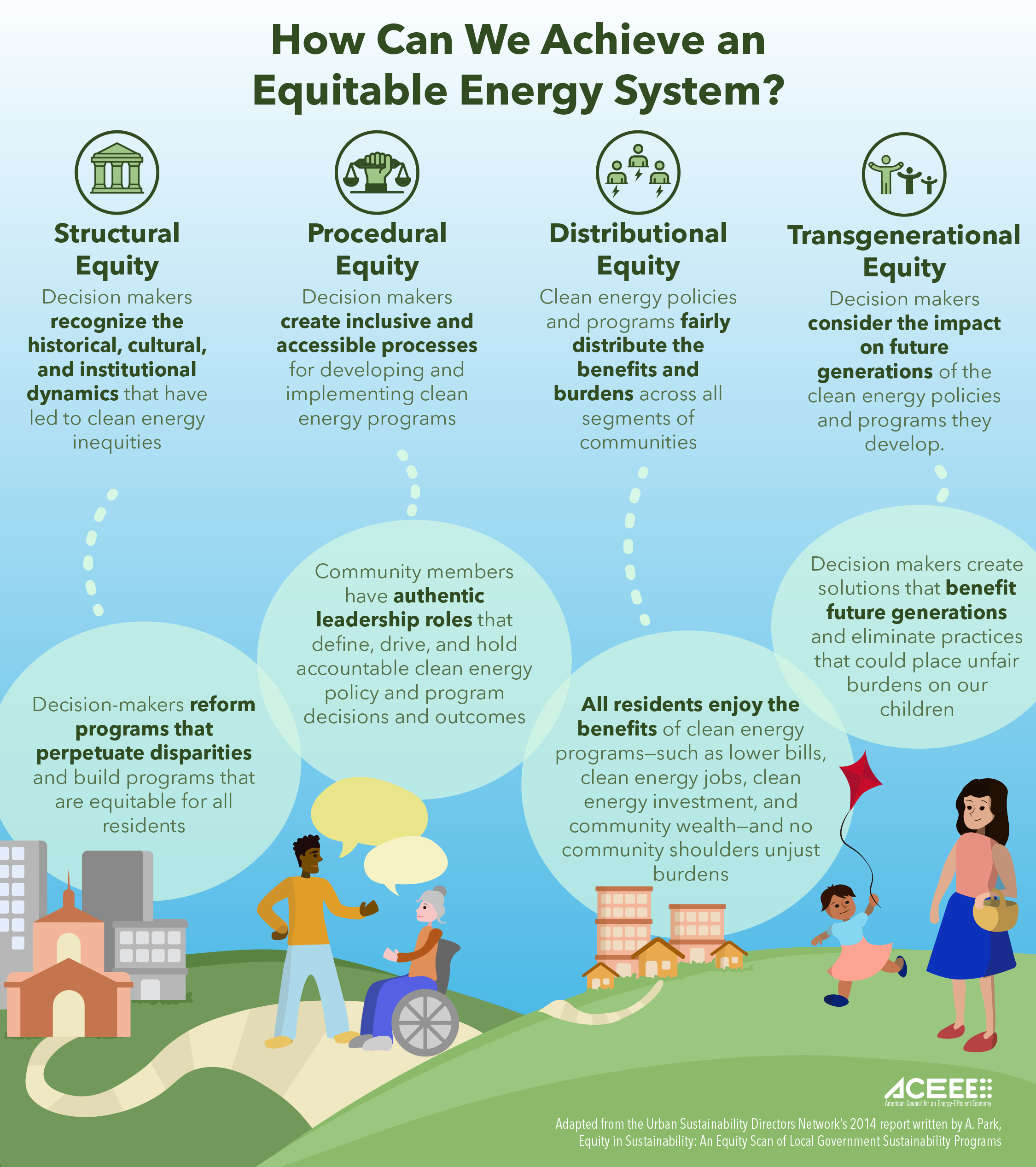The impacts of climate change and other environmental hazards disproportionally harm Black, Hispanic, and Native American communities. Due to challenges such as living in older, less energy-efficient housing, these households face dramatically higher energy burdens—spending a more significant portion of their income on energy bills—than the average household. High energy burdens are correlated with a greater risk for respiratory diseases, increased stress, and difficulty moving out of poverty. As ASAP works to advance our mission, we are committed to ensuring that our work contributes to building a more equitable and just energy future.
What is energy equity and energy justice?
Energy equity recognizes the historical and cumulative burdens of energy systems borne by frontline and low-income communities and by Black, Brown, and Native people. To eliminate these disparities, energy equity centers their voices in energy planning and decision-making and ensures the fair distribution of clean energy benefits and ownership. (From the Energy Equity Project, Energy Equity Framework)
Energy justice refers to achieving equity in both the social and economic participation in the energy system while also remediating social, economic, and health burdens on those disproportionately harmed by the energy system. Energy justice explicitly addresses the concerns of communities at the frontline of pollution and climate change (“frontline communities”), working-class people, indigenous communities, and those historically disenfranchised by racial and social inequity. Energy justice aims to make energy accessible, affordable, clean, and democratically managed for all. (From the Initiative for Energy Justice)

How do efficiency standards help?
Inefficient appliances saddle Americans with higher costs of living, often forcing people to forgo necessities such as food and medicine to pay energy bills. Additionally, renters, who are disproportionately low-income, often pay higher monthly utility bills because landlords opt to install or replace failed appliances with cheap but inefficient models. Standards set a minimum efficiency level for household appliances and other products. All communities benefit from technological innovations and lower costs when standards are in place and up-to-date. Efficiency standards can also help reduce emissions and air pollutants that negatively impact the environment and human health.
What resources are available to learn more about energy equity and justice?
Organizations:
- Energy Equity Project (EEP)
- Initiative for Energy Justice (IEJ)
- Urban Sustainability Directors Network (USDN)
- Justice40 Initiative at the Department of Energy (DOE)
- American Council for an Energy-Efficient Economy (ACEEE)
- National Consumer Law Center (NCLC)
Reports and white papers:
- Drehobl, A., L. Ross, and R. Ayala. 2020. How High Are Household Energy Burdens? Washington, DC: American Council for an Energy-Efficient Economy.
- Energy Equity Project. 2022. Energy Equity Framework: Combining data and qualitative approaches to ensure equity in the energy transition. University of Michigan – School for Environment and Sustainability (SEAS).
- Equity and Buildings: A Practice Framework for Local Government Decision Makers. Urban Sustainability Directors Network.
- Overly Impacted & Rarely Heard: Incorporating Community Voices Into Massachusetts Energy Regulatory Process. National Consumer Law Center.
- U.S. Consumer Attitudes Toward Appliance Efficiency Standards and Purchasing Behaviors by Income, Race, and Homeownership. Consumer Federation of America and CLASP.
- Advancing Equity in Utility Regulation.
Tools and resources for practitioners:
- RMI - Equitable Home Electrification Toolkit
- EPA - Climate and Economic Justice Screening Tool
- Energy Justice Mapping Tool
- EPA - Environmental Justice Screening and Mapping Tool
- ACEEE - Energy Equity for Renters Toolkit
- NAACP - Just Energy: Reducing Pollution, Creating Jobs
- USDN - Equity Foundations Training

